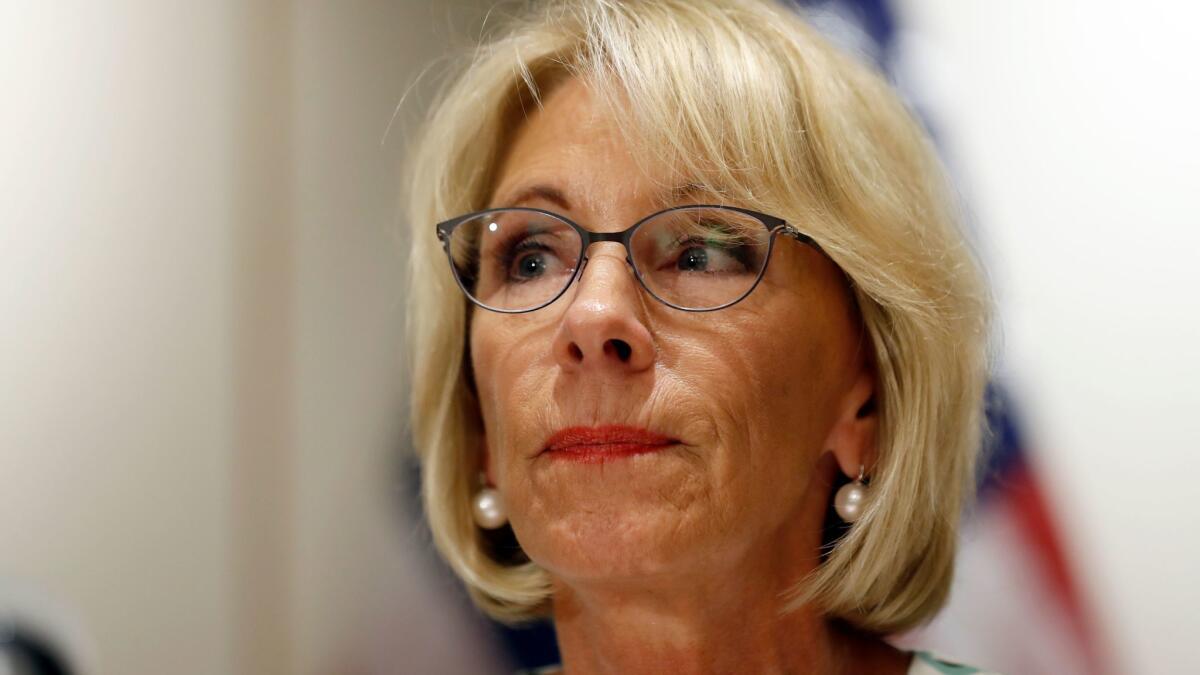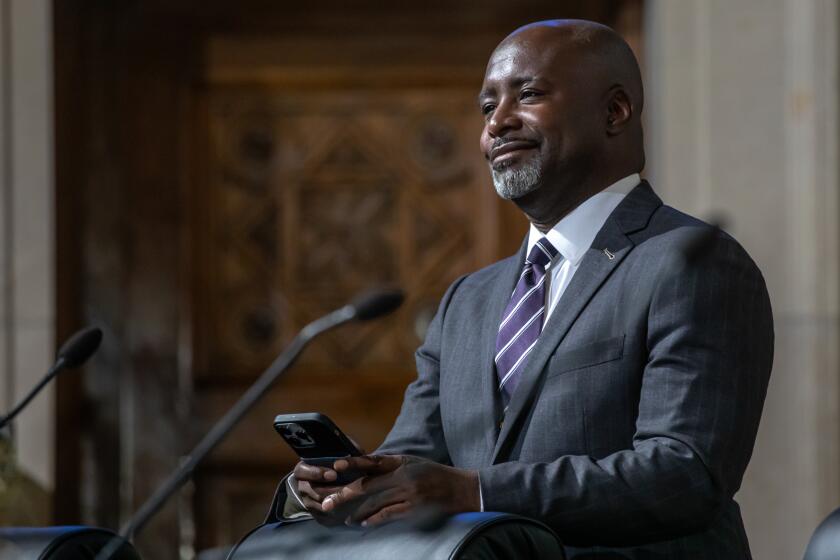California colleges vow to press on against sexual assault despite any federal rollback in protections

- Share via
California educational leaders vowed Thursday to press on with aggressive action against campus sexual assault despite any future rollback of the federal guidelines that have prompted universities to crack down on the problem.
In a speech Thursday, U.S. Education Secretary Betsy DeVos lambasted Obama-era guidelines as unfair and coercive and announced plans to review them. Later, in an interview with CBS News, she said she intended to rescind the 2011 guidelines, which laid out how campuses should investigate sexual assault cases and lowered the standard of proof needed to find the accused responsible.
University of California President Janet Napolitano said she was “extremely troubled” by indications that the federal government aimed to undo six years of work intended to strengthen protections against sexual violence.
“Today’s move will prompt fears of reduced support for survivors of sexual violence, and raise questions about how schools prevent and respond to reports of sexual violence and sexual harassment,” Napolitano said in a statement. “Even in the midst of unwelcome change and uncertainty, the university’s commitment to a learning environment free of sexual violence and sexual harassment will not waver.”
Last year, the UC system implemented a sweeping plan to strengthen protections against sexual misconduct, adding mandatory education and training for students, staff and faculty; confidential advocates for victims; and more staff to handle Title IX cases.
The UC Office of the President has increased funding for the efforts from $67,000 in 2013 to $1.6 million budgeted for 2016-17. Individual campuses spend additional money on sexual misconduct prevention efforts.
Stanford University Provost Persis Drell also reaffirmed her university’s commitment to fighting sexual misconduct. The university has been criticized for tilting its process toward the accused — last year, for instance, it began requiring a unanimous finding of responsibility by a three-person panel — but also provides support not required by law. Stanford pays for nine hours of attorney time for each side, for instance.
“Stanford has no intention of retreating, in any way, on the subjects of sexual assault and harassment,” Drell said in a statement. “We continue our commitment to move forward.”
Cal State beefed up its efforts against sexual violence on its 23 campuses in November 2014, when it appointed the nation’s first systemwide Title IX compliance officer.
“The issue of sexual assault and ensuring that our campuses are safe and free from sexual violence is a priority for CSU leadership,” Cal State spokeswoman Toni Molle said. “We have upcoming meetings scheduled with Secretary DeVos to discuss Title IX with a hope that we have a seat at the table as these policy discussions continue.”
In her speech, DeVos criticized universities for staging “kangaroo courts,” joining those who say universities fail to extend due process protections for those accused of sexual misconduct. She said some campuses do not inform the accused of the allegations before a decision is rendered, and also don’t allow in such campus proceedings legal representation, access to evidence, the right to cross-examine witnesses or the ability to appeal findings. She also criticized the Obama administration’s guidelines lowering the standard of proof required in sexual misconduct cases.
Mark Hathaway, a Los Angeles-area attorney who has represented accused college students in about 60 cases, said he was gratified by DeVos’ move to review federal guidelines. He said he particularly hoped that accused students would have access to evidence and the ability to challenge statements by the accusers and witnesses before a finding was made.
Hathaway also said that allowing one person to act as both investigator and judge, a model used by UC and many other universities, was unfair to the accused.
He added that there was a “wide variance” in policies across California campuses. He praised UCLA, for instance, for fair handling of cases — including providing support for the accused. But he said other campuses allow “secret witnesses” and deny meaningful access to evidence before a decision is made.
“A system that isn’t fair doesn’t help the victims or the accused,” Hathaway said. DeVos said much the same in her remarks Thursday.
Campus officials for the UC system, Cal State, Stanford and Occidental College said their processes already provide the safeguards raised by DeVos.
Pamela Thomason, Cal State’s systemwide Title IX officer, said the university uses a “fair and impartial process to which all participants have equal access and in which all are treated with dignity and respect.”
Danica Myers, Occidental’s interim Title IX coordinator, noted that federal officials last year found the college had sufficiently revamped its procedures in sexual misconduct cases to comply with federal law.
“The college stands by its current policies and procedures,” Myers said in a message to the campus community. “They are fair, aligned with our mission and values, and consistent with federal and state law.… No matter what happens, we remain committed to our goal of eliminating sexual misconduct on campus, and to the idea that the best way to address sexual assault is to prevent it from happening in the first place.”
Kathleen Salvaty, UC’s systemwide Title IX coordinator, said the 10-campus system moved to use a single investigator to question the accused and accuser separately rather than a hearing at which both sides appeared, in part to avoid direct confrontation and minimize trauma. But any finding may be appealed at a hearing, with both sides allowed to submit questions indirectly to witnesses and each other, she said. Attorneys are not allowed to cross-examine, she said, because the hearings are not criminal proceedings.
Salvaty also noted that any potential changes proposed by DeVos could be constrained by current state and federal law. Under a 2014 California law, for example, campuses are required to use the lower standard of proof — preponderance of evidence rather than clear and convincing evidence — that DeVos criticized. Federal law already guarantees an equal right to appeal, access to information gathered in the case and the ability to bring an attorney or other adviser to hearings.
Asked whether UC officials intended to weigh in during the public comment period that DeVos plans, Salvaty said, “We just want a strong and fair process.”
Twitter: @teresawatanabe
Twitter: @RosannaXia
More to Read
Sign up for Essential California
The most important California stories and recommendations in your inbox every morning.
You may occasionally receive promotional content from the Los Angeles Times.












